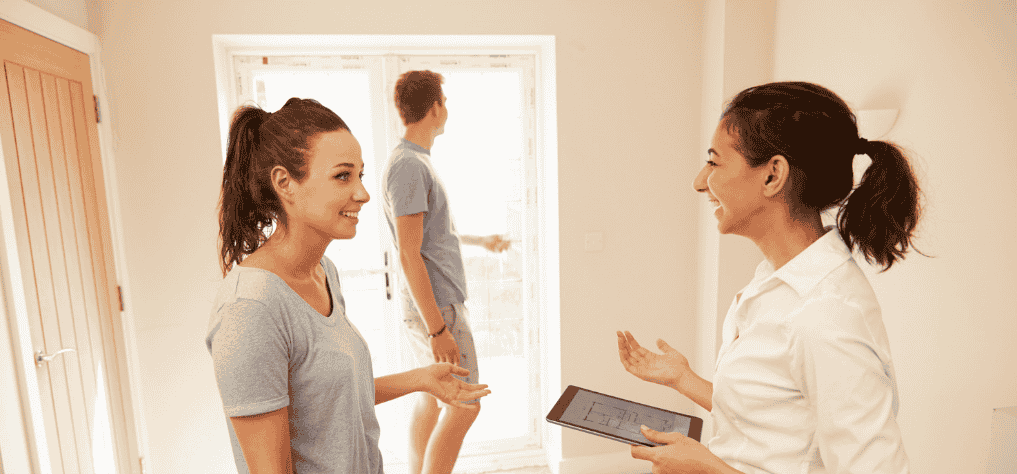Taking out a mortgage is a big deal – but it's also how most people buy their first home. It doesn't need to be overwhelming when it's actually pretty straightforward. We explain how it all works in this guide.
The Topics Covered in this Article Are Listed Below:
- What to Expect When Buying Your First Home
- What Is the Definition of a First Time Buyer?
- Help for First Time Buyers
- How Do I Apply for the Mortgage for My First Home?
- What Should I Look For When Buying My First Home?
- If You're Struggling to Save for Deposit
- The Mortgage Application Process
- How to Improve Your Chances of Getting a Mortgage
- Types of Mortgage and the Terminology
- Deposits for First Time Buyers
- First Time Home Buyer Benefits
- Additional Costs
- Steps to Buying a House for the First Time
- Insurance
What to Expect When Buying Your First Home
Buying your first property should be exciting – it’s the place you’ll call home and where you’ll start a new life. That's why we've written this First Time Buyer's Guide: to explain everything you need to know about purchasing a property so you can embark on your house-hunting mission with confidence and concentrate on what it’s really all about – finding your first home.

What Is the Definition of a First Time Buyer?
To qualify as a first time buyer, you must have never acquired a major interest in a residential property or an equivalent interest in land situated anywhere in the world.
Why does it matter if you’re a first time buyer? Because first time buyers currently receive coveted Stamp Duty relief and are eligible for certain schemes. These benefits can make a real difference to the costs you face when buying a home – but obviously, not everyone qualifies as a first time buyer.
It doesn’t matter whether you purchased the property alone or with others – if you purchased the property with other people then you all need to meet the first time buyer criteria.
You won’t qualify as a first time buyer if:
- You previously inherited or were given a property as a gift
- You previously acquired a property through a financial institution on behalf of a person under an alternative finance scheme
- You were added to the title deeds of a property someone else purchased
However, you may still qualify if:
- You previously acquired a property as a trustee, unless you’re also a beneficiary of the trust
- You own or previously owned non-residential or mixed-use property, but only if the property does or didn’t include dwelling
- The interest you acquired was the grant or assignment of a lease with less than 21 years to run
Help for First Time Buyers
There are various schemes designed to help first time buyers get their first home, as well as more general schemes that can help you get a mortgage if you’re struggling. As mentioned above, you can get an exemption from Stamp Duty Land Tax up to a certain threshold of property value, which can reduce the additional costs of buying a home.
There is also other help that you may be able to get:
- Mortgage Guarantee Scheme - this provides motivation for lenders to offer mortgages with only a 5% deposit, making it easier for first time buyers to raise the funds needed to cover the deposit on their own
- Lifetime ISAs- LISAs are savings accounts that you will get a 25% bonus, up to £1000 a year, if you use the funds for a deposit on your first house. Again, this makes it easier for new buyers to get together the money needed for a deposit. The downside is that if you take out the money for any reason other than a house deposit or retirement, you would face a fee
- Right to Buy - if you live in a council-owned property, you may have the right to purchase the property. You will get a discount based on how many years you’ve lived in the house or flat that you want to buy
- Joint Mortgages - if you’re unable to borrow the amount you want on a mortgage due to low income, you might be able to get a joint ownership mortgage. This means that you apply for the mortgage with another person, often a parent or close relative. Since the lender will look at the combined income and credit history of all the applicants, this can make it easier to get approved for a larger mortgage to buy your first home. There’s also another kind of joint mortgage called joint borrower sole proprietor where both you and a parent are on the mortgage but only you are on the title deeds of the property
- First Homes Scheme - this is a scheme that lets you buy a new build home at a lower price than the market value. You have to be local to the area or be a key worker to be eligible for this discount
How Do I Apply for the Mortgage for My First Home?
Applying for your first mortgage can be daunting. We always recommend using an experienced mortgage broker when you’re looking for a mortgage for your first home. Mortgage brokers will help by assessing your needs and then finding the best mortgage offer for you. They’ll also help signpost you towards any of the above schemes that might be helpful in enabling you to purchase a home.
Once you’re happy with an offer that the broker has found for you, they’ll help handle the application process, so you don’t have to deal with large amounts of unfamiliar paperwork. If you want help applying for your first mortgage, get in touch. Our brokers have years of experience in helping people secure the best first time buyer mortgage rates and deals.
Want to Know More?
Fill out this form and we'll get in touch with you to book a free session with one of our advisers.
What Should I Look for When Buying My First Home?
When looking for your first home, it’s normal to want to find your dream house. However, most of us are unlikely to get our dream home as our first property, if only because most ideal homes are very expensive. It’s important to remember that while buying your first home is a big step, it’s only your first step onto the property ladder. You don’t need to overextend yourself from the outset. Over time, you’ll be able to build up equity that you can use towards your next home.
Some of the important factors things to consider when looking for your first home include the following:
- Condition - it’s always important to look at the condition of a property. While most houses will need some refurbishment or home improvements eventually, some properties can have costly repair bills waiting for the new owners
- Location - one of the most important things to consider is getting a property in the right location for you. Check transport links and ideally visit the area at different times of the day or week to get a good feel for where you could be living. If you have children you’ll also want to check which schools the property is in the catchment areas of and their Offsted ratings. Bear in mind this can affect property prices
- Space - while it’s possible to get a home improvement mortgage later to add more space to your home, it’s not always possible to add more rooms. Therefore, make sure you have enough space, or the potential for space, for your current and future plans
- Amenities - property prices tend to be higher in areas with good amenities, but if you’re looking at cheaper properties, you need to decide whether you can live without immediate access to local amenities
- Construction type - not all houses are made the same. As well as standard construction types, you’ll also find non-standard construction buildings. Many of these can be more challenging when applying for a mortgage. You might need a higher deposit, or you might need to find a specialist lender. For example, houses made from concrete or timber-framed properties can be difficult to get loans for. You might also struggle to get a loan for a high-rise flat or a particularly small flat
- Nearby construction plans - it’s always worth checking the historical and future building work in the area. Historical records might show issues such as potential mineshafts in the area, which could cause problems when you search for a mortgage. Future plans will also show you what kind of neighborhood you’ll live in
- Additional costs - there are always additional costs, beyond simply the price of the property. We’ll go over some of these further on in this guide, but it’s also worth looking for ongoing costs. For example, if you’re looking at a leasehold property rather than a freehold property, you should consider how much your ground rent charges will be, as well as any management charges in flats
If You're Struggling to Save for a Deposit
Saving up for a deposit can be difficult. Most lenders will require at least 5% of the property’s value as a deposit, though some lenders will require more. You can expect a higher deposit requirement in cases such as:
Some of the schemes listed earlier can help with building your deposit . For example a Lifetime ISA can make it easier to save and the Mortgage Guarantee Scheme makes it easier to find a mortgage with only a 5% deposit. Nonetheless, it can still be a challenge to get the funds together for a deposit.
If you’re still unable to save for a deposit, you can look at no-deposit mortgages. This would let you borrow 100% of the property’s value, but the lender will usually require some kind of security for the loan. This could be covered by a relative putting a charge on their property, or by putting money in a savings account with the lender. These would be held until you have paid off a certain amount of the mortgage loan. Nothing happens to the security as long as you make your payments in full and on time, but the property or savings might be at risk if you miss payments. These mortgages often have higher interest rates than standard mortgages.
The Mortgage Application Process
The mortgage application process can be quite long and there are several stages to go through when buying a property. Our expert brokers can help you through every step, handling the whole process for you. We can even arrange legal services, insurance, protection, removals and more.
The main stages of the process are:
- Initial application - when your adviser finds you a mortgage that works for you, they’ll help you make an initial application
- Soft credit check - the lender may do a soft credit check to see if you’re eligible to apply for the mortgage. They’ll look for any issues such as missed payments, defaults, and more
- Income check - the lender will also want to look in detail at your income and outgoings. They’ll consider loan payments and other monthly requirements on your funds, such as childcare, to make sure that you can safely afford the mortgage payments
- Decision in Principle - if your credit score is good and your income is high enough, you will be given a DIP (Decision in Principle). This means that the lender agrees to make you a full mortgage offer as long as the next checks do not show anything unexpected. This is also called an Agreement in Principle
- Hard credit check/mortgage application - once you accept the DIP, the lender will do a hard credit check on you which will leave a footprint on your credit profile
- Mortgage underwriting and valuation - when assessing your application, the lender will underwrite it which basically means that they check all evidence of your income. They also instruct a valuation for lending purposes to be carried out on the property
- Mortgage offer - if the lender is happy with your application and their checks, they’ll make you a formal mortgage offer
- Conveyancing - once you accept the offer, the legal paperwork has to be sorted. We can refer you to a solicitor who can help make sure that this step goes smoothly
- Exchange and completion - your solicitor will exchange contracts with the seller's solicitor. This is when you put down your deposit and are legally bound to the property. The purchase completes when money is transferred on a set date
How to Improve Your Chances of Getting a Mortgage
There are some things you can do to improve your chances of getting a mortgage or securing a more competitive deal:
- Save up a higher deposit amount - lenders are more likely to accept applications with higher deposits. You’ll also often get more favourable interest rates if you have a higher deposit
- Aim to increase your income - while this is easier said than done, it can help in the long run to have a higher income and improve your chances of passing affordability checks. If you apply for a mortgage with a partner, lenders will consider both of your incomes for affordability
- Lower outgoings - lenders will consider your outgoings and other loan payments against your income. If you can reduce your outgoings by paying off other loans, you’re more likely to pass affordability checks.
- Improve your credit rating - if your credit history has issues such as missed payments, defaults, CCJs, or other problems, you might find it hard to get a mortgage. You can look at improving your credit rating by paying off debts on time and waiting until some time has passed so that your bad credit events won’t be as recent and therefore won’t have as large of an impact on your credit score
- Borrow a smaller amount - if affordability is the problem, you could look at purchasing a cheaper property
- Buy a standard property - non-standard properties such as high-rise flats can be harder to get a mortgage on since they’re riskier investments for lenders. You might have better luck trying to get a mortgage for a standard property
- Ask for help from family - getting a joint mortgage with your parents or another relative can help you get approved. Other alternatives include: gifted deposits, 100% mortgages where your parents can put up security that they get back and joint borrower sole proprietor
Types of Mortgage and the Terminology
Buying a home is the most expensive purchase you’ll ever make, but people do it all the time. How? They take out a mortgage.
A mortgage is a big loan. You borrow money from a lender to buy a property. Eventually, you pay back the loan with interest. This typically happens over time via regular payments – otherwise known as a traditional repayment mortgage – or in one big hit after many years – normally called an interest-only.
You have to put down a deposit when you take out a mortgage. The deposit is a percentage, a minimum of 5% - 10%, of the value of the property you want to buy. The mortgage amount makes up the remainder, up to 90% - 95% of the property’s value; this is the loan-to-value or LTV.
A mortgage is a type of secured loan, which means it’s secured against the property you buy. The lender’s interest in the property is noted with the title deeds at Land Registry. This gives them the ability to repossess the property if you can’t keep up the payments. You could also lose your deposit, depending on the sale price at the time of repossession.
Monthly Payments

Paying your mortgage each month isn’t really that different from paying rent, only instead of sending your money to a landlord, you give it to a mortgage lender. Whether you opt for a repayment or interest-only mortgage will determine what your monthly payments are made up of.
Repayment Mortgage
The most common type of mortgage is a repayment mortgage, this is where you pay back a bit of your mortgage debt each month with some interest. The part that goes towards paying your outstanding mortgage debt is called a “capital payment”. If you meet your repayments throughout the term of your mortgage – which is normally 25 - 30 years but can be any almost any term you want - then you’ll pay back the full amount of money you borrowed plus all the interest charged during the term of the mortgage. It’s only after you make your final payment that you’ll own 100% of the equity in your property – this is when the lender no longer has any rights because you’ve paid everything you owe and now it’s all yours. The maximum LTV available for a repayment mortgage is 95%. You can use our mortgage repayment calculator to get an estimated amount of what your monthly mortgage payments might be based on the interest rate
Interest-Only Mortgage
There’s another type of mortgage called an interest-only mortgage. Like a repayment mortgage, an interest-only mortgage can be almost any term you want, however the maximum LTV currently available is 75%, not 95%. This is one of the reasons interest-only mortgages are less common among first time buyers - as they usually require a high LTV - but they’re still an option if you find they suit you better.
As the term “interest-only” suggests, you only make monthly payments on the interest being charged. No payments go towards reducing your mortgage balance. Your actual loan debt, which you used to buy your home, remains the same until the end of your mortgage term. That’s when you have to pay it all back in one go. This is another reason why interest-only mortgages are less popular among first time buyers: you must have the means to repay your mortgage at the end of the term and be able to provide evidence that your plans will be enough to clear the outstanding balance at that time.
You can find out more about the different types of mortgages, interest rates and repayment vehicles in our guide: Mortgage Types Explained.
Interest
Interest rates are how banks and building societies make money. They charge you for borrowing money because that’s the service they’re providing you with. The amount you pay in interest is calculated by applying your interest rate – expressed as a percentage – to your outstanding loan amount. You pay your interest each month, often alongside your capital payment. There are different types of mortgage interest rates: fixed, tracker, variable, etc.
A fixed rate repayment mortgage is often a popular choice for first time buyers. With this kind of mortgage, your total monthly payment is made up of 2 elements – interest and capital. In the beginning the total monthly payment is mostly interest as the mortgage balance is at its highest – and the interest is worked out on the total amount of outstanding debt.
As your total monthly payment includes a capital payment towards the mortgage balance, each month your mortgage balance – or overall debt – reduces. Since your monthly payment to the lender does not change, the amount that you pay in interest falls slightly and the amount towards your mortgage balance continues to increase for the duration of the fixed rate period.
Term of Your Mortgage
Your mortgage term is the period over which you pay your mortgage. It’s typically 25 - 30 years but varies on a case-by-case basis. The length of time you agree on will affect your monthly payments as well as the total amount you pay in interest, so it’s important to work out your monthly budget before making any final decisions. It’ll give you a better idea of the term you’re realistically looking at, based on the repayments you can afford. The shorter the term, the less you pay overall - but the higher your monthly payments.
The term of the mortgage doesn't need to remain the same. It can be changed. When you come to the end of your existing deal and look to remortgage, you'll find this is a good time to review the mortgage term as your affordability, budget and circumstances may be different.
Deposits for First Time Buyers
You have to save up for a deposit if you want to take out a mortgage. First time buyer deposits are typically at least 5% - 10% of the total market value of the property but can be more.
The amount you’re able to put down in deposit helps determine how big of a mortgage you’ll need. The bigger your deposit, the less you need to borrow from the lender and the less you’ll have to pay in interest. Larger deposits usually give you access to more competitive mortgage rates because they result in a lower LTV, which gives the lender more security so they can consider charging a lower rate of interest. Read more about deposits in our Mortgage Deposit Guide. You can use our first time buyer mortgage calculator to get an estimate of how much you can borrow for your mortgage.
There are some mortgages where the buyer doesn’t have to put down any deposit; these have sometimes been called 100% mortgages. The name is misleading as your parent or other relative still has to provide something in place of a deposit, like cash savings or the equity in their own home. If this sounds like something you’d like to consider, then call us on 0330 433 2927 and speak to an adviser who’ll explain your options in more detail.

First Time Home Buyer Benefits
Whenever you hear about first time buyers, they’re usually at the centre of some big scary story about how they’re struggling to get on the property ladder. Property values – and therefore deposits - have increased, so there’s no debate that buying a home is more expensive than it used to be.
However, there are actually some nice benefits to being a first time buyer.
Stamp Duty Exemption
Stamp Duty is the tax paid on residential property purchases. As a first time buyer, you typically pay less Stamp Duty than everyone else. The amount you’ll pay ultimately depends on the value of the property you’re purchasing.
On Properties up to £425,000
You’ll pay £0 Stamp Duty Tax.
On Properties up to £625,000
You’ll pay 5% Stamp Duty on a property worth over £425,000 and up to £625,000. The 5% will only be payable on the amount from £425,001 - £625,000.
Over £625,000
If you’re buying your first home and it’s worth more than £625,000, you won’t receive any Stamp Duty relief. You’ll pay Stamp Duty at the standard rate. We explain how the different rates work in more detail in our Stamp Duty guide.
Help in Raising a Deposit
Lifetime ISA
You can take out a Lifetime ISA if you’re 18 - 39 years old and you’re either a first time buyer or saving for retirement. You can save up to £4,000 a year and the government will add a 25% bonus, i.e. a maximum of £1,000 a year.
The maximum contribution you can receive from the government is £32,000, but this would only be possible if you took out the ISA at 18 and continued to put in the maximum of £4,000 each year until you're 50 years old.
Help with Low Deposit
Shared Ownership
Shared ownership is where you part-buy and part-rent a home from a housing association. It’s only available to first time buyers or previous homeowners. As you’re only buying a portion that is often less than 50% of the purchase price, you take out a much smaller mortgage – which requires a proportionately smaller deposit than if you were buying the whole property. You can choose to gradually increase your share of the property until you own it outright by a process called “staircasing”.
Additional Costs

There are some additional costs that come with buying a property for the first time. It’s best to be aware of these from the outset, so you don’t get any nasty surprises along the way. We’ve provided an easy to understand breakdown below.
Stamp Duty Tax
As we explained above, you’ll only pay Stamp Duty as a first time buyer if you’re purchasing a property worth over £425,000 – and even then you’ll still receive some relief, unless the property is worth over £625,000.
Valuation/Survey
Your mortgage lender will need to confirm the value of your property before they lend you money. While your mortgage application is being processed, the lender will arrange a valuation for lending purposes. Some lenders might not charge you for this, depending on the type of mortgage product you select.
You might need a survey in addition to a valuation for lending purposes. There are 2: a homebuyer report and a full structural survey.
Part of a homebuyer report includes a valuation, but the difference between a homebuyer report and valuation for lending purposes is that the surveyor also prepares a report for you on the state of the property. This report identifies any work that might be necessary both immediately and in the near future.
A full structural survey is much more detailed and is only really necessary if you plan on doing extensive work to the property, it was built before the 1900s, it’s of unusual construction, or if you feel that there might be problems with the actual structure – e.g. if it’s had underpinning due to subsidence in the past.
Legal/Conveyancing
It’s unsurprising that there are a lot of laws and legal requirements involved in buying a house. You’ll need a good conveyancer or solicitor to guide you through the minefield of contracts and ticks in boxes. Your conveyancer or solicitor will also represent you by liaising with the seller’s solicitor, that way they can make sure everything is completed on schedule and your purchase goes smoothly. Conveyancing fees can vary quite a bit, so it’s worth asking for several quotes if you want to keep the cost down. We can give you a free quote for conveyancing services with JC Legal.
Mortgage Broker Fee
A mortgage broker manages your entire mortgage application. At John Charcol, we not only guide you through the application process, fill out the paperwork and find the best rates for your needs and circumstances, we can help you move into your new home, set up service providers and more with our exclusive concierge service. Our mortgage broker fees are based on 2 considerations: the loan amount and the complexity of your individual circumstances. Our purpose is to make buying your first home what it should be – enjoyable.
Removal Fees
You’ll usually have to pay removal fees to transfer your possessions from your previous residence to your new one, so you may need to budget for this. We can arrange removals for you with our convenient concierge service. It’s one of the benefits that come with being a John Charcol customer.
Steps to Buying a House for the First Time
Now you know a bit more about what’s involved in buying your first home, you’re ready to learn about the process you’ll go through.
1Speak with a Mortgage Broker
They’ll help you establish how much you can potentially borrow and which type of mortgage would suit you. Your adviser will make a mortgage recommendation and, if you’re happy to proceed, will go about securing your DIP (Decision in Principle). Your DIP is a promise from the lender that they’ll grant you a mortgage for that amount, on the condition that the information you’ve given is correct.
2Find a Property
Once you know how much you can afford, you can start the property search. It’s worth speaking to multiple estate agents as they’ll have different listings. Remember to ask questions about the local areas and the condition of each property.
3Put in an Offer
When you’ve found your dream home, you’ll want to make an offer. As you’ll have secured your DIP at this stage, you’ll be in a great position to put an offer on a property. Once your offer has been accepted, you can proceed with your application.
4Make a Full Mortgage Application
Your mortgage adviser will take you through the full mortgage application process. It’s also during this period that the lender organises a mortgage valuation.
5Conveyancing
The solicitors/conveyancers will draw up contracts for the purchase and check everything is correct. They look for onerous clauses in the title deeds and check any leases for things that might cause problems in the future.
6Exchanging Contracts
Your solicitor and the seller’s solicitor will now exchange contracts. You won’t have paid for the property at this point, however you’ll have legally agreed to buy it on a specified date. It’s at this point that you hand over your deposit money.
7Completion
Completion takes place once you’ve exchanged contracts and paid for your new home in full. Money is transferred to the seller’s solicitor and the keys are released to you.
The time it takes from that first, initial application to completion varies on a case-by-case basis.

Insurance
No lender will loan you money for a property without buildings insurance – and this is the minimum level of insurance that you need.
There are other types of insurance you should think about when applying for a mortgage.
Here are the main types of insurance:
- Buildings insurance – this is required by all lenders
- Contents insurance – it’s not a necessity when you take out a mortgage, but it protects everything within your home in case of an accident or theft
- Income protection insurance – this helps ensure that your monthly payments will be covered if you’re unable to work due to sickness or injury
- Specialist – this isn’t for everyday circumstances, but if your property has a special construction feature, is in a high-risk area, will be unoccupied for long periods of time, etc.
While we’re processing your mortgage application, our in-house team can find and arrange suitable insurance for you, using our panel of trusted insurers.
Get in touch with our experts

0330 433 2927




